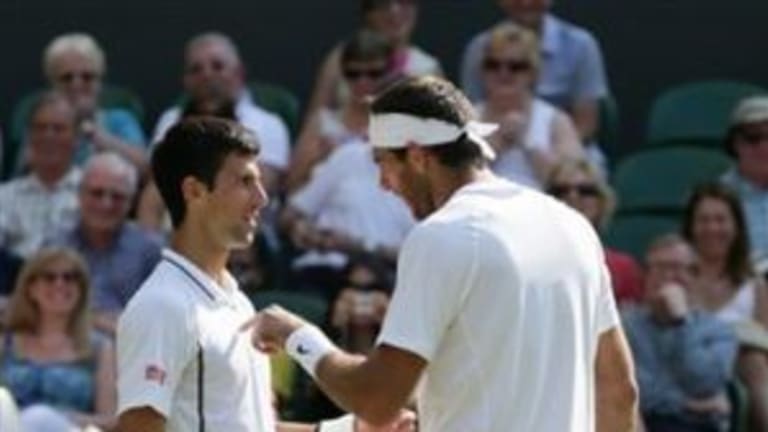Novak's final backhand also helped bring some 11th-hour sanity to this tournament. After all of the surprises that have been sprung on us, the No. 1 and No. 2 seeds, Djokovic and Murray, have found their way safely to the final. This will mark the third time in the last four Grand Slams that they’ve met in the title match. They deserve their top rankings.
In the past, I’ve found the Muzzovic finales lacking in edge. Each plays a defensive-minded game, so there’s little contrast in style, and their rallies lack the complex push and pull we get when Djokovic and Nadal face off. The Nole-Andy rivalry has also lacked a compelling psychological dynamic. Neither of them qualifies as the older, established star, à la Federer, and neither qualifies as the upstart. Murray and Djokovic were born within a couple of weeks of each other, and they don’t seem to hold any lingering grievances or grudges.
In this setting, though, none of that will be necessary. The drama will come not from the relationship between the players, but from Murray’s quest to—yes, you know what I’m about to say—become the first British man to win Wimbledon since Fred Perry in 1936. And there’s no more appropriate player for him to do it against than Djokovic, the world No. 1.
Has Murray’s moment arrived? The progression would make sense. From 2009 to 2011 he lost in the semifinals here. In 2012, he lost in the final, before going on to win Olympic gold and the U.S. Open. At age 26, his long apprenticeship should now be over.
One small problem remains, however: Djokovic is still the better player. He has six Grand Slams to Murray’s one, and an 11-7 record in their head to head. Djokovic also won their other major final of 2013, in a convincing four sets in Australia, and he’ll come in having already been tested in battle this week by del Potro.
How can Murray overcome all of this? He can start by drawing two positives from their head to head: He beat Djokovic in their only meeting on grass, in the Olympic semifinals here last summer; and he beat him in a Slam final, in five sets, at the U.S. Open in the fall. At the Olympics, Murray says he was especially fired up by the home crowd and the atmosphere around London to earn a medal for his country; beating Djokovic in that match guaranteed him of at least a silver. At the Open, he benefited from the hurricane-like conditions, which suited his safer style of play.
Wimbledon will obviously be a different setting and a different match from either of those two. We have an idea of what we’ll get from Djokovic. There will be some edgy moments, maybe a blown set, a half-dozen pained looks at his player box, perhaps a slammed racquet—something to let out the tension. Once it’s out, though, he’ll likely be extremely solid. Against del Potro, Djokovic slipped more often than he had in his previous matches. That may have been, in part, because he was forced to change shoes; the pair he had been wearing had extra pimples on the sides to help him grip the court, pimples that have been deemed illegal here. A little less grip could hurt Novak, but he survived del Potro without it. Whatever shoes he wears, I expect Djokovic's quality to be in evidence.
Instead, the match may come down to Murray and his ability to be effectively aggressive. He was able to do that at the Olympics last year, especially in the final against Federer. But Djokovic gives him a different ball and a different set of problems. He can attack Murray’s weak second serve better than anyone, and he’s just as quick and consistent from the baseline. Murray won in New York by settling back and forcing Djokovic to do the offensive work, but that wasn’t successful a second time in Australia. There, on Melbourne Park’s slow hard courts, Murray couldn’t find a way through the Djoker and spent the last set flailing futilely at the ball.
Grass should help. The fans should help. Serving as well as he did in the semifinals should help. Will the moment help? As Murray said on Friday, no one, not even himself, will know how he’s going to feel the day of the match. He said he wasn’t especially nervous before the Olympic final, because he knew he was guaranteed of two silver medals that day (the other came in mixed doubles)—it showed in the free, attacking tennis he produced to win the gold. But Murray said that he was extremely nervous before last year’s Wimbledon and U.S. Open finals. Even he won’t be able to control where his head is on Sunday morning.
For that reason, based on the percentages, I’ll take Djokovic to win. As del Potro showed yesterday, playing brilliantly against Nole is one thing; beating him is another. Even if they're friendly, and even if Djokovic would like to see Murray win this tournament someday, the world No. 1 won’t want to take a second defeat in three major finals to the world No. 2.
Whoever wins, though, drama is guaranteed—the question is whether Murray's tears will be of joy or pain this time. For those us hoping that this rivalry is ready to take off, we couldn’t ask for a better launching pad than the one we’ll get on Sunday.
The Pick: Djokovic in five sets
